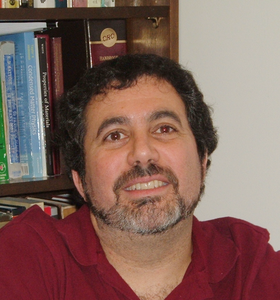
Professor of Chemistry and Mathematics
Department of Chemistry and Courant Institute of Mathematical Sciences, NYU
Email: mark.tuckerman@nyu.edu
Mark Tuckerman obtained his B.S. in physics from the University of California at Berkeley in 1986 and his Ph.D. from Columbia University in 1993, working in the group of Bruce J. Berne. From 1993-1994, he held an IBM postdoctoral fellowship at the IBM Forschungslaboratorium in Rüschlikon, Switzerland in the computational physics group of Michele Parrinello. From 1995-1996, he held an NSF postdoctoral fellowship in Advanced Scientific Computing at the University of Pennsylvania in the group of Michael L. Klein. He is currently Professor of Chemistry, Physics, and Mathematics at New York University. His research program spans a variety of topics including development of free-energy based enhanced sampling tools for predicting the conformational equilibria of complex molecules, exploration of structure and polymorphism in molecular crystals, simulation studies of electrolyte liquids for clean energy applications, development of machine learning models for electronic structure theory and statistical mechanics applications, and path-integral methods for quantum dynamics. He has published over 200 articles that have garnered 27,000 citations. Honors and awards include the Japan Society for the Promotion of Science Fellowship, the Friedrich Wilhelm Bessel Research Award from the Alexander von Humboldt Foundation, the Camille Dreyfus Teacher-Scholar Award, an NSF CAREER Award, and the NYU Golden Dozen Teaching Excellence Award, the Andreas C. Albrecht Lectureship from Cornell University, the Kennedy Lectureship from Washington University, the Institute Lectureship from the Indian Institute of Technology, Kanpur, where he is now Distinguished Visiting Professor, election as a Fellow of the AAAS, a Dreyfus award for Machine Learning in the Chemical Sciences and Engineering. He is the Principal Investigator of the new Simons Center for Computational Physical Chemistry at New York University. In addition, he is currently Chair of the Chemistry Department at NYU.
Selected Publications:
- “Electrostatic Potential of Functional Cations as a Predictor of Hydroxide Diffusion Pathways in Nanoconfined Environments of Anion Exchange Membranes”. T. Zelovich, D. Dekel, M. E. Tuckerman J. Phys. Chem. Lett. 15, 408 (2024).
- “An interoperable implementation of collective-variable based enhanced sampling methods in extended phase space within the OpenMM package”. S. Bajpai, B. K. Petkov, M. Tong, C. R. A. Abreu, N. N. Nair, M. E. Tuckerman, J. Comp. Chem. 44, 2166 (2023).
- “Geometric Deep Learning for Molecular Crystal Structure Prediction”. M. Kilgour, J. Rogal, M. E. Tuckerman J. Chem. Theor. Comput. 19, 4743 (2023).
- “Machine learning the Hohenberg-Kohn map to excited states.” Y. Bai, L. Vogt-Maranto, M. E. Tuckerman, W. J. Glover Nature Comm. 13, 7044 (2022).
- “A data-driven and topologically aware mapping approach for the prediction of molecular crystal hydrates.” R. S. Hong, A. Mattei, A. Sheikh, M. E. Tuckerman Proc. Natl. Acad. Sci. U.S.A. 119, e2204414119 (2022).
- “Imaginary-time open-chain path-integral approach for two-state time correlation functions and applications to charge transfer.” Z. Liu, W. Xu, M. E. Tuckerman, X. Sun J. Chem. Phys. 157, 114111 (2022).
- “Non-monotonic temperature dependence of hydroxide diffusion in anion exchange membranes.” T. Zelovich, L. Vogt-Maranto, C. Simari, I. Nicotera, M. A. Hickner, S. J. Paddison, C. Bae, M. E. Tuckerman Chemistry of Materials 34, 2133 (2022).


